The United Nations Development Programme (UNDP) is a United Nations agency tasked with helping countries eliminate poverty and achieve sustainable economic growth and human development. The UNDP emphasizes developing local capacity towards long-term self-sufficiency and prosperity.

The Maldives has remained an independent nation throughout its recorded history, save for a brief spell of Portuguese occupation in the mid-16th century. From 1887 to 1965, the country was a British protectorate while retaining full internal sovereignty. At its independence in 1965, the Maldives joined the United Nations on 20 September.
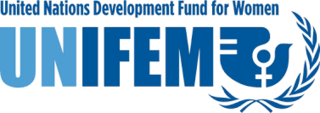
The United Nations Development Fund for Women was established in December 1976 originally as the Voluntary Fund for the United Nations Decade for Women in the International Women's Year. Its first director was Margaret C. Snyder. UNIFEM provided financial and technical assistance to innovative programmes and strategies that promoted women's human rights, political participation and economic security. Since 1976 it supported women's empowerment and gender equality through its programme offices and links with women's organizations in the major regions of the world. Its work on gender responsive budgets began in 1996 in Southern Africa and expanded to include East Africa, Southeast Asia, South Asia, Central America and the Andean region. It worked to increase awareness throughout the UN system of gender responsive budgets as a tool to strengthen economic governance in all countries. In 2011, UNIFEM merged with some other smaller entities to become UN Women.
Sunila Abeysekera was a Sri Lankan human rights campaigner. She worked on women's rights in Sri Lanka and in the South Asia region for decades as an activist and scholar. Quitting a career as a singer, Abeysekera briefly joined the Janatha Vimukthi Peramuna and then founded the Women and Media Collective in 1984. As head of the INFORM Human Rights Documentation Centre, she monitored human rights violations by all parties in the civil war. She received the United Nations Human Rights Award in 1999 and the Didi Nirmala Deshpande South Asian Peace and Justice Award in 2013.

Bernadine Rose Senanayake, JP, UM, better known as Rosy Senanayake, is a Sri Lankan politician, beauty pageant titleholder and activist currently serving as Presidential Advisor on Local Government affairs. She was the Mayor of Colombo from 2018 to 2023, and former Prime Minister's Spokesperson and the Deputy Head of the Prime Minister's Office for Ranil Wickramasinghe. She has been an activist on several issues and an active figure in the opposition gaining much limelight.

Rosanna Flamer-Caldera is a Sri Lankan LGBT rights activist. She lived in the US for over a decade and when she returned to Sri Lanka, she became the female Sri Lankan representative to ILGA and later its co-secretary general. She helped to found the Women's Support Group in 1999 and Equal Ground in 2004. She is also related to former Ford model and Wildlife and nature protection society Sri Lanka ambassador, Dr. Adam Flamer-Caldera.
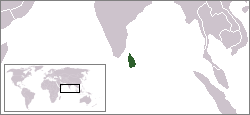
Lesbian, gay, bisexual, and transgender (LGBT) people in Sri Lanka face significant challenges not experienced by non-LGBT residents.
The Commonwealth Youth Programme, also known as CYP, is an international development agency working with young people between the ages of 15 and 29. Part of the Commonwealth Secretariat, CYP is active in the Commonwealth's 54 member countries. CYP has a head office in London with four centres in Africa, Asia, Caribbean and Pacific. Currently there are Four Regional Directors and 16 programme officers plus support staff are working there.
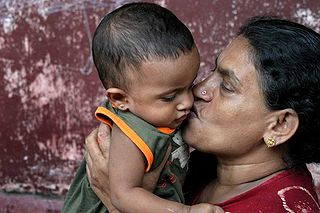
All ethnic groups in Sri Lanka have clear distinctions regarding the roles of the sexes. Sri Lanka was the first nation in the world to elect a female head of government, Sirimavo Bandaranaike. Bandaranaike won the election in 1960 after S.W.R.D. Bandaranaike, the preceding leader who was also her husband, was murdered by a spy.

The Center for Women's Global Leadership, based at Rutgers University, was founded in 1989 by Charlotte Bunch, the former executive director and an internationally renowned activist for women's human rights. Executive Director Krishanti Dharmaraj is also the founder of the Dignity Index and co-founder of WILD for Human Rights and the Sri Lanka Children's Fund. The former executive director, Radhika Balakrishnan, is now the faculty director, and a professor in the Department of Women's and Gender Studies at Rutgers, chair of the Board of the US Human Rights Network, and a board member of the Center for Constitutional Rights. Located on Douglass Residential College at Rutgers University, CWGL is a unit of International Programs within the School of Arts and Sciences and is a member of the Institute for Women's Leadership, a consortium of women's programs at Rutgers.
Asia Source was an event series that promoted and coordinated the use of free and open-source software (FOSS) in Asia. It took place three times: the first event was hosted in Bangalore, India in 2005, the second in Sukabumi in West Java, Indonesia in January 2007. The third event was held in Silang, Cavite in the Philippines in 2009.
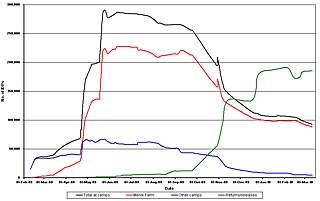
The final stages of the Sri Lankan Civil War created 300,000 internally displaced persons (IDPs) who were transferred to camps in Vavuniya District and detained there against their will. This process, together with conditions inside the camps and the slow progress of resettlement attracted much concern and criticism from inside and outside Sri Lanka. On 7 May 2009 the Sri Lankan government announced plans to resettle 80% of the IDPs by the end of 2009. After the end of the civil war Sri Lankan President Mahinda Rajapaksa gave assurances to foreign diplomats that the bulk of the IDPs would be resettled in accordance with the 180-day plan. On 1 December 2009, the IDPs were given limited freedom of movement. The pace of resettlement increased in 2010. The resettlement process was completed and camps were officially closed on 25 September 2012. However, the final batch of IDPs consisting of 110 families were relocated in Kepapilavu in Mullaitivu District-away from their original homes.
War crimes during the final stages of the Sri Lankan Civil War are war crimes and crimes against humanity which the Sri Lanka Armed Forces and the Liberation Tigers of Tamil Eelam have been accused of committing during the final months of the Sri Lankan Civil War in 2009. The war crimes include attacks on civilians and civilian buildings by both sides; executions of combatants and prisoners by both sides; enforced disappearances by the Sri Lankan military and paramilitary groups backed by them; sexual violence by the Sri Lankan military; the systematic denial of food, medicine, and clean water by the government to civilians trapped in the war zone; child recruitment, hostage taking, use of military equipment in the proximity of civilians and use of forced labor by the Tamil Tigers.

The Millennium Development Goals Achievement Fund (MDG-F) was an international cooperation mechanism committed to eradicating poverty and inequality and to accelerating progress towards the Millennium Development Goals (MDGs) worldwide. Its aim was to improve livelihoods and to influence public policy, which made it responsive to the needs of the poorest populations.

Equal Ground is a non-profit organization based in Colombo, Sri Lanka, that advocates for political and social rights for lesbian, gay, bisexual, transgender (LGBT), intersex and queer people. The organization, established in 2004, claims to be the first organization in Sri Lanka that welcomes people of all sexual orientations and gender identities... The organization was founded by Sri Lankan gay rights activist Rosanna Flamer-Caldera and offers trilingual publications and services. It aims to achieve its goals through political activism, education, personal support, building awareness and through organized community events. It has been working more closely with lesbian, bisexual and transgender women in areas of human rights, law reform, sexual health, and violence based on sexual orientation and gender identity. The organization continues to face many challenges working in Sri Lanka where homosexuality is stigmatized and considered criminal offense that can earn up to ten years of prison under the law. Efforts of the LGBT activists to undo the British colonial law criminalizing sodomy was not repealed, but the law was expanded to include women and the penalty was worsened. Queer groups in Sri Lanka have frequently stated that some of their members have been subjected to harassment—by blackmail or by threats with exposition or arrest—by police and other people, using the legal provision.
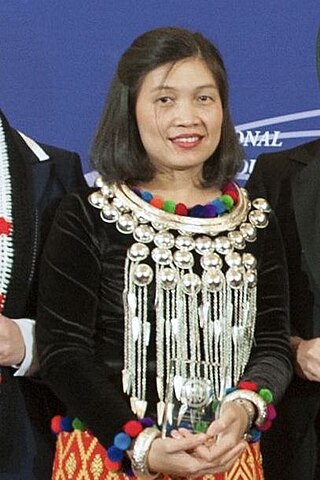
May Sabai Phyu is a Kachin activist from Burma. She is active in promoting human rights, freedom of expression, peace, justice for Myanmar's ethnic minorities, anti-violence in Kachin State, and lately in combating violence against women and promoting gender equality issues.

Gender inequality in Sri Lanka is centered on the inequalities that arise between men and women in Sri Lanka. Specifically, these inequalities affect many aspects of women's lives, starting with sex-selective abortions and male preferences, then education and schooling in childhood, which influence job opportunities, property rights, access to health and political participation in adulthood. While Sri Lanka is ranked well on several gender equality indices in comparison to other countries in the region, there are also some sources that question the verity of these indices. However, globally, Sri Lanka ranks relatively lower on gender equality indices. Overall, this pattern of social history that disempowers females produces a cycle of undervaluing females, providing only secondary access to health care and schooling and thus fewer opportunities to take on high level jobs or training, which then exacerbates the issue of low political participation and lowered social rights, a cycle studied and noted on by Dr. Elaine Enarson, a disaster sociologist studying the connection between disaster and the role of women.

Hasina Jalal is an advocate for women's human rights and democracy in Afghanistan. In 2014, Jalal was elected by public vote to receive the "N-Peace Award" from the UNDP Asia Pacific Regional Office and the UN Secretary General's Special Advisor on the University for Peace. She is the Co-founder and Executive Director of the National Association of Afghanistan Civil Society and the first alliance of South Asian women on women's economic, social, and cultural rights in Sri Lanka. Jalal has served in the government of Afghanistan as a Research Team Lead and Policy Expert at the Presidential Palace and as a Policy Advisor to Minister and Director of Program Design and Donor Coordination Directorate at the Ministry of Mines and Petroleum of the Government of Afghanistan.
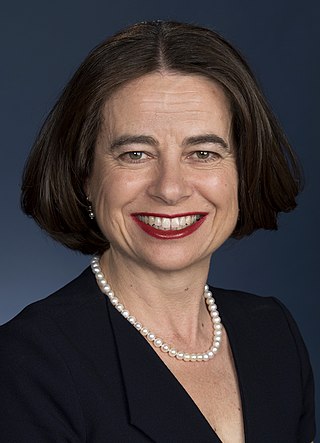
Robyn Mudie is an Australian diplomat who most recently served as the Ambassador to Vietnam from 2019 to 2022, and was the High Commissioner to Sri Lanka from 2012 until 2016 with non-resident accreditation to the Maldives.
Rangita de Silva de Alwis is a Sri Lankan-American academic, lawyer and women's rights expert. She is well known as a strong advocate demanding equal and fair representation of women in all spheres. She has worked in over 25 countries as a human rights scholar with different governmental organizations, non-governmental organizations, and academic institutions.













